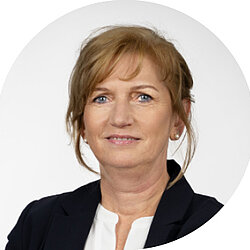A slipped disc is usually the result of a relatively normal ageing process of the spine. This can take various forms: gradual - i.e. the disc gradually becomes flatter and loses its elasticity - or more sudden. In the latter case, the ageing of the spine manifests itself in a herniated disc. Tears occur in the ring of the intervertebral disc, causing the core of the disc to bulge out and protrude from the ring.
The typical age for a herniated disc is between the early 30s and mid-40s, when the core of the disc is still elastic enough to be squeezed by tears in the annulus. Typical risk factors are lack of exercise and being overweight.
Symptoms of a slipped disc
A herniated disc does not always necessarily cause pain. However, it is particularly unpleasant if the herniated disc presses on a nerve and this becomes inflamed. This inflammation of the nerve root leads to severe pain. Sensory disturbances and even paralysis are also possible. The symptoms also depend on where the herniated disc is located. If the cervical spine is affected, the pain can radiate into the arms or there may be symptoms of paralysis or paresthesia.
A herniated disc in the thoracic spine is very rare and manifests itself as back pain, usually in the affected section of the spine. In the lumbar spine, severe pain can occur in the lower back, sometimes radiating into the legs. Sensory disturbances and even paralysis are also possible in this area. It is particularly unpleasant for patients if the sciatic nerve is affected by a slipped disc and the pain radiates from the buttocks down the back of the thigh and into the foot.
Diagnosis of a herniated disc - what now?
A detailed medical history and a physical and neurological examination are used to localize the pain and determine the cause. Using palpation, tapping and pressure examinations in the area of the spine and back muscles, the back specialist checks whether there are any abnormalities or pain points, for example. He also tests the range of motion of the spine.
The intensity of the pain and its localization usually give the specialist an indication of the location of the herniated disc in the spine. If this is not clear, imaging procedures such as computer tomography (CT) and magnetic resonance imaging (MRI) can make a herniated disc visible. The images also show the extent and direction of the herniated disc.
Therapy: How a herniated disc is treated
In the case of pain or mild muscle weakness, conservative treatment of the herniated disc is usually sufficient - for example with medication, physiotherapy or injection therapy. If the symptoms are more severe, for example if the disc presses directly on the spinal cord or severe paralysis occurs, surgery is necessary. At Sportklinik Hellersen, herniated discs are operated on using microsurgery and minimally invasive techniques. The affected disc is removed in order to relieve the spinal cord nerves, which are constricted by the herniated disc.
In some cases, the worn disc is also replaced with a prosthesis. The implant maintains the space between the vertebrae as well as the mobility of the spine and also relieves pain.
Can sport prevent a slipped disc?
Well-trained back muscles support the spine and can prevent back pain. The focus here is on training strength in order to build up the core muscles. Gentle sports such as cycling and rowing are recommended. Rowing primarily involves back and forth movements that provide all-round training without causing stressful rotation and leverage forces on the intervertebral discs. Exercising twice a week is completely sufficient to avoid putting too much strain on your back.
Good, well-trained back muscles do not directly prevent a slipped disc, but they can compensate for the symptoms. The bottom line: significantly less back pain, as most complaints are due to instability problems.
And this also applies if there is already a slipped disc. Once the contact with the nerve has healed, it is crucial to give the back support again in order to stop the instability from progressing. This is why trunk muscle training should be started after the acute phase.

Claudia Schnitzler-Moos
Secretariat Conservative Orthopedics
- Phone+49 2351 945-2249
- Fax +49 2351 945-2253
- sekretariat.nolte@hellersen.de
Private outpatient clinic
Phone +492351 945-2249
Fax +492351 945-2253
sekretariat.nolte@hellersen.de

Sekretariat Wirbelsäulenchirurgie
Secretariat Spine Surgery
- Phone+49 2351 945-2106
- Fax +49 2351 945-2109
- mvz.neuro@hellersen.de

Andrea Huhn
Secretariat Special Spine Surgery
- Phone+49 2351 945-2551
- Fax +49 2351 945-2552
- sekretariat.meier@hellersen.de

